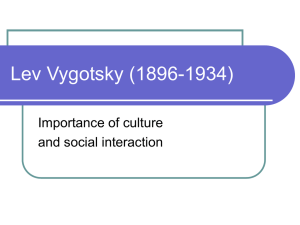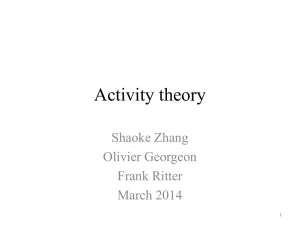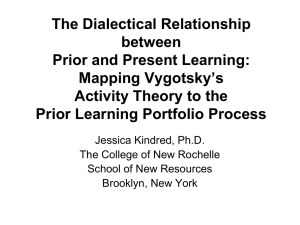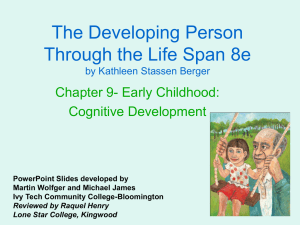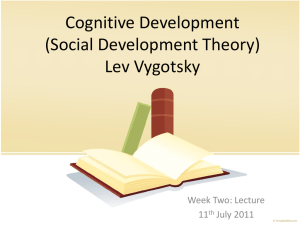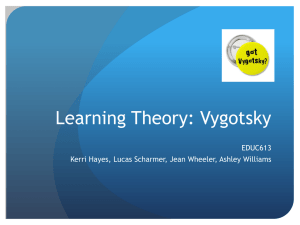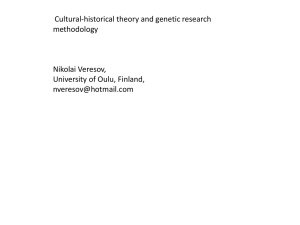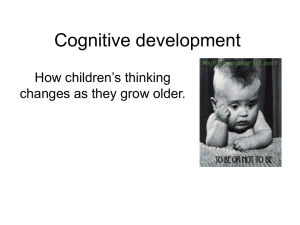Lev Vygotsky's Educational Theory: An Analysis
advertisement
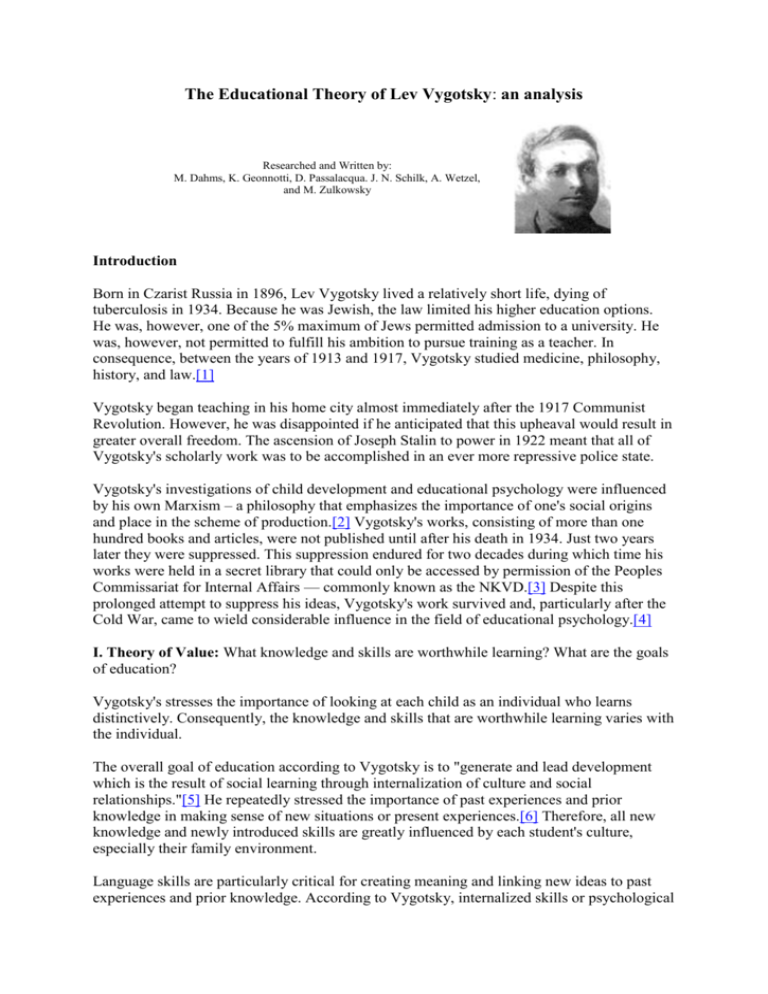
The Educational Theory of Lev Vygotsky: an analysis Researched and Written by: M. Dahms, K. Geonnotti, D. Passalacqua. J. N. Schilk, A. Wetzel, and M. Zulkowsky Introduction Born in Czarist Russia in 1896, Lev Vygotsky lived a relatively short life, dying of tuberculosis in 1934. Because he was Jewish, the law limited his higher education options. He was, however, one of the 5% maximum of Jews permitted admission to a university. He was, however, not permitted to fulfill his ambition to pursue training as a teacher. In consequence, between the years of 1913 and 1917, Vygotsky studied medicine, philosophy, history, and law.[1] Vygotsky began teaching in his home city almost immediately after the 1917 Communist Revolution. However, he was disappointed if he anticipated that this upheaval would result in greater overall freedom. The ascension of Joseph Stalin to power in 1922 meant that all of Vygotsky's scholarly work was to be accomplished in an ever more repressive police state. Vygotsky's investigations of child development and educational psychology were influenced by his own Marxism – a philosophy that emphasizes the importance of one's social origins and place in the scheme of production.[2] Vygotsky's works, consisting of more than one hundred books and articles, were not published until after his death in 1934. Just two years later they were suppressed. This suppression endured for two decades during which time his works were held in a secret library that could only be accessed by permission of the Peoples Commissariat for Internal Affairs — commonly known as the NKVD.[3] Despite this prolonged attempt to suppress his ideas, Vygotsky's work survived and, particularly after the Cold War, came to wield considerable influence in the field of educational psychology.[4] I. Theory of Value: What knowledge and skills are worthwhile learning? What are the goals of education? Vygotsky's stresses the importance of looking at each child as an individual who learns distinctively. Consequently, the knowledge and skills that are worthwhile learning varies with the individual. The overall goal of education according to Vygotsky is to "generate and lead development which is the result of social learning through internalization of culture and social relationships."[5] He repeatedly stressed the importance of past experiences and prior knowledge in making sense of new situations or present experiences.[6] Therefore, all new knowledge and newly introduced skills are greatly influenced by each student's culture, especially their family environment. Language skills are particularly critical for creating meaning and linking new ideas to past experiences and prior knowledge. According to Vygotsky, internalized skills or psychological tools "are used to gain mastery over one's own behavior and cognition."[7] Primary among these tools is the "development of speech and its relation to thought."[8] Vygotsky maintained that language plays a central role in cognitive development. He argued that language was the tool for determining the ways a child learns "how" to think. That is because complex concepts are conveyed to the child through words. "Learning, according to Vygotsky, always involves some type of external experience being transformed into internal processes through the use of language."[9] It follows that speech and language are the primary tools used to communicate with others, promoting learning. Vygotsky promoted the development of higher level thinking and problem solving in education. If situations are designed to have students utilize critical thinking skills, their thought processes are being challenged and new knowledge gained.[10] The knowledge achieved through experience also serves as a foundation for the behaviors of every individual.[11] II. Theory of Knowledge: What is knowledge? How is it different from belief? What is a mistake? A lie? According to Davydov and Kerr, it was a momentous occasion in the history of psychology when Vygotsky asserted "...specific functions are not given to a person at birth but are only provided as cultural and social patterns."[12] Vygotsky saw "intellectual abilities as being much more specific to the culture in which the child was reared."[13] Through observation and study Vygotsky came to understand that people adapted to their surrounding environment based on their interpretations and individual perceptions of it.[14] Thus, humans are not born with knowledge nor is knowledge independent of social context. Rather, one gains knowledge as one develops by way of social interactions with peers and adults. Vygotsky does not make as drastic a distinction between knowledge and belief as some other theorists do. For him, knowledge is obtained through past experiences, social situations, as well as ones general environment. In similar manner, beliefs are instilled into an individual via culture and parental upbringing. "Mistakes are crucial in Vygotsky's theory of learning. In the course of development, mistakes are made during the process of "concept formation." They are important in that they impact future learning.[15] From Vygotsky's perspective, "A concept emerges and takes shape in the course of a complex interaction aimed at the solution of a problem...[A] concept is ...an active part of the intellectual process."[16] We see, then that, for Vygotsky, concept formation is a dynamic, ever-changing activity during which "... the child relies on their own perception to make sense of objects that appear to them to be unrelated ... the child creates his or her own subjective relationships between objects and then mistakes his or her egocentric perspective for reality."[17] This stage of development is known, paradoxically, as "incoherent coherence."[18] During this stage, the making of mistakes is an integral part of a child's development. Also at this time, the child's organization schema becomes less egocentric and begin to incorporate additional information gained from experience into his or her thought processes.[19] In this way, mistakes can be corrected and new knowledge gained. Therefore mistakes are developmentally necessary, resulting from the "...role of social interaction in transformation of prior knowledge.[20] Tentatively one might infer that Vygotsky would view a lie as something that occurs as a result of the desire to conform to social norms. For example one might feel one way but report a more socially acceptable reality. III. Theory of Human Nature: What is a human being? How does it differ from other species? What are the limits of human potential? According to Marxist theory, "The essence of man is no abstraction inherent in each single individual. In its reality it is the ensemble of the social relations."[21] Vygotsky would agree that we develop as humans through the ways we interact with those around us. His view of human nature fits with his Marxist ideology. Human beings can only be understood within the context the time period and the part of the world in which they live. Human nature cannot be understood as never-changing and universal, but as always depending on its specific social and historical formation. This principle does not leave out biological factors.[22] To be human, however, means that you have surpassed a level of functioning that your biological traits would otherwise dictate. [23] Although some animals have the ability to create and use material tools, humans have the ability to utilize psychological tools. In other words, human beings are differentiated by their ability to develop psychological tools that are "used to gain mastery over one's own behavior and cognition"[24] that other forms of life are not capable of developing. Some psychological tools include: "language, different forms of numeration and counting, mnemotechniques, algebraic symbolism, works of art, writing, schemes, diagrams, maps, blueprints, etc."[25] In his theories, Vygotsky placed great emphasis on the importance of spoken language, arguably the most critical tool that sets us apart from other species. He asserts that "speech is a very powerful psychological tool that lays the foundation for basic structures of thinking later in one's development."[26] Vygotsky further explains that speech is the first psychological tool used by children to communicate with others who share the environment. Naturally, this is continued through adulthood, as speech is a primary tool used for learning. Vygotsky insists that "humans learn best in cooperation with other humans."[27] "Vygotsky contended that, unlike animals - who react only to the environment, humans have the capacity to alter the environment for their own purposes. It is this adaptive capacity that distinguishes humans from lower forms of life. ...The animal can only be trained. It can only acquire new habits. It can through exercises and combinations perfect its intellect, but is not capable of mental development through instruction in the real sense of the word."[28] Vygotsky's concept of the zone of proximal development (ZPD) posits that human potential is theoretically limitless; but the practical limits of human potential depend upon quality social interactions and residential environment. This zone of proximal development is "the distance between the actual developmental level as determined by independent problem solving and the level of potential development as determined through problem solving under adult guidance or in collaboration with more capable peers."[29] In theory, then, so long as a person has access to a more capable peer, any problem can be solved. IV. Theory of Learning: What is learning? How are skills and knowledge acquired? According to Piaget, learning is what results from both mental and physical maturation plus experience.[30] That is, development preceded learning. In contrast Vygotsky observed that learning processes lead development.[31] Vygotsky maintained that "learning is a necessary and universal aspect of the process of developing culturally organized, specifically human, psychological functions."[32] In other words, learning is what leads to the development of higher order thinking. According to Vygotsky the two primary means of learning occur through social interaction and language. Language greatly enhances humans' ability to engage in social interactions and share their experiences. "The most important fact uncovered through the ... study of thought and speech is that their relationship undergoes many changes."[33] Initially, a child's new knowledge is interpsychological, meaning it is learned through interaction with others, on the social level.[34] Later, this same knowledge becomes intrapsychological, meaning inside the child, and the new knowledge or skill is mastered on an individual level.[35] The previously mentioned idea of the zone of proximal development (ZPD) is central to Vygotsky's view on how learning takes place. He described this zone as, "the distance between the actual development level as determined by independent problem solving and the level of potential development as determined through problem solving under adult guidance or in collaboration with more capable peers."[36] Vygotsky maintained that learning occurs just above the student's current level of competence.[37] It follows then, that the copying student will have a higher performance when working with a more capable student. The zone of proximal development works in conjunction with the use of scaffolding. "Scaffolding is a six-step approach to assisting learning and development of individuals within their zone of proximal development."[38] Knowledge, skills and prior experiences, which come from an individual's general knowledge, create the foundation of scaffolding for potential development. At this stage, students interact with adults and/or peers to accomplish a task which could possibly not be completed independently. The use of language and shared experience is essential to successfully implementing scaffolding as a learning tool. [39] V. Theory of Transmission: Who is to teach? By what methods? What will the curriculum be? Vygotsky defined those who are to teach as the "More Knowledgeable Other." The MKO is anyone who has a better understanding or a higher ability level than the learner, particularly in regards to a specific task, concept or process.[40] Traditionally the MKO is thought of as a teacher or an older adult. However, this is not always the case. Other possibilities for the MKO could be a peer, sibling, a younger person, or even a computer. The key to MKO is that they must have more knowledge about the topic being learned than the learner does.[41] Teachers or more capable peers can raise the student's competence through the zone of proximal development (ZPD). Vygotsky's findings suggest methodological procedures for the classroom. "In Vygotskian perspective, the ideal role of the teacher is that of providing scaffolding (collaborative dialogue) to assist students on tasks within their zones of proximal development."[42] During scaffolding the first step is to build interest and engage the learner. Once the learner is actively participating, the given task should be simplified by breaking it into smaller subtasks. During this task, the teacher needs to keep the learner focused, while concentrating on the most important ideas of the assignment. One of the most integral steps in scaffolding consists of keeping the learner from becoming frustrated. The final task associated with scaffolding involves the teacher modeling possible ways of completing tasks, which the learner can then imitate and eventually internalize. [43] Vygotsky recommended a social context wherein a more competent learner would be paired with a less competent one, so that the former can elevate the latter's competence. This social context promotes sustained achievement and cognitive growth for less competent students."[44] Accordingly, students need to work together to construct their learning, teach each other so to speak, in a socio-cultural environment. In-class opportunities for collaboration on difficult problem-solving tasks will offer support to students who are struggling with the material. By interacting with more capable students who continue to mediate transactions between the struggling students and the content, all students will benefit.[45] The implications of Vygotsky's theories and observations for educators are several and significant. In Vygotsky's view, the teacher has the collaborative "task of guiding and directing the child's activity."[46] Children can then solve novel problems "on the basis of a model he [sic] has been shown in class."[47] In other words, children learn by solving problems with the help of the teacher, who models processes for them and his or her peers, in a classroom environment that is directed by the teacher. In essence, "the child imitates the teacher through a process of re-creating previous classroom collaboration."[48] It is important to note that the teacher does not control the class with rule and structure; rather, the teacher collaborates with the students and provides support and direction.[49] Assignments and activities that can be accurately completed by a student without assistance, indicate that the student has previously mastered the necessary prior knowledge. In the majority of classrooms this would be the conclusion of a unit; however, this is Vygotsky's entry point. However, as previously mentioned, the teacher must carefully group the student that "can potentially develop in collaboration with a more capable person."[50] In our research, we found limited references to Vygotsky's specific views on curriculum content. One exception involves the teaching of writing to preschoolers. According to Garton and Pratt, Vygotsky argued for shifting the teaching of writing to preschool. They explain that Vygotsky differentiated between two forms of speech: spoken and written. Vygotsky, as cited by Garton and Pratt, asserts that a child develops an understanding that spoken speech can be symbolized in writing by progressing from "drawing things to drawing speech."[51] Vygotsky suggested then that the preschool curriculum should be designed so that it was organized to "ease child's transition from drawing things to drawing speech."[52] Learning to master tools and technologies should also be included in the curriculum. "Students should be taught how to use tools such as the computer, resource books, and graphs in order to better utilize these tools in the future.[53] In this way, students will benefit as these tools and technologies influence the individual's thinking (along with the development of language).[54] In sum, Vygotsky's findings suggest that the curriculum should generally challenge and stretch learner's competence.[55] The curriculum should provide many opportunities to apply previous skills, knowledge and experiences, with "authentic activities connected to real-life environment."[56] "Since children learn much through interaction, curricula should be designed to emphasize interaction between learners and learning tasks."[57] VI. Theory of Society: What is society? What institutions are involved in the educational process? According to Vygotsky, "society is the bearer of the cultural heritage without which the development of mind is impossible."[58] This 'society' allows the learner to develop cognitively through social interactions. As a result, the use of language makes it possible for a child to communicate and share the environment from within their society. "Every function in the child's cultural development appears twice: first, on the social level, and later, on the individual level; first, between people (interpsychological) and then inside the child (intrapsychological)."[59] Perhaps Vygotsky was comfortable generalizing about 'society' in this way because he was living in post-revolutionary times. The revolution had been accomplished in Russia, and the "New Soviet Man", was emerging in the Soviet Union, and the dictatorship of the proletariat" was at hand. So far as the institutions involved in the educational process are concerned, Moll reports that Vygotsky "considered school the best laboratory of human psychology."[60] He noted: "At first glace, it may be easily seen that no special educational environment is needed, that education may be accomplished in any environment whatsoever. ... It is not very hard to conclude that no sort of artificial educational environment has to be created, that life educates better than any school. ... This view is wrong, however."[61] For Vygotsky, society (and therefore social interaction) happens in schools. "Schools are incorporated into the larger society and have that as their context, so that some of their activity settings are determined by this larger contextuality."[62] "For Vygotsky the classroom is also a social organization that is representative of the larger social community ... it is the social organization ... that is the agent for change in the individual."[63] Fhis statement was not meant to "imply that informal education was not important."[64] Rather, as we stated before, for Vygotsky informal education is used by children through speech and language to develop higher mental functions. He stressed that "children's learning begins long before they attend school. ... Any learning a child encounters in school always has a previous history."[65] VII. Theory of Opportunity: Who is to be educated? Who is to be schooled? Vygotsky repeatedly asserts that it is within the "social environment" that learning takes place. Since no individual is able to escape their social surroundings, all within a society are inadvertently being educated. Vygotsky writes: "...In this sense, education in every country and in every epoch has always been social in nature. Indeed, by its very essence it could hardly exist as anti-social in anyway. Both in the seminary and in the old high school, in the military schools and in the schools for the daughters of the nobility ... it was never the teacher or the tutor who did the teaching, but the particular social environment in the school which was created for each individual instance."[66] Every person is socialized in the society in which they are enveloped. Socialization is the process of cultural transmission, both unintentional and deliberate.[67] According to Vygotsky, this process is central to education. We have already established that Vygotsky was a Marxist and, so far as we know, a supporter of the revolution; and further that socialization, education, and schooling are in a symbiotic relationship. So it seems likely that he would have favored reform of the entire socialization and educational process up to and including schooling, in order to create "The New Soviet Man." Schooling, while similar to education, involves formalized teaching by a specialist in a specific place designated for instruction, such as a traditional school.[68] Vygotsky's Russia of the late 1920's and early 1930's was populated by millions of illiterate peasants and workers, and it is difficult to imagine that he would have regarded them as unworthy of the opportunities that schooling affords. Indeed, Vygotsky probably understood his theories to be, in part, a response to the need to solve the urgent and practical problems of schooling the new socialist state. When referring to the education of children with disabilities, Vygotsky pointed out that "changes in the context of education may have profound consequences for the developmental processes."[69] He went on to say that children with disabilities should be included in the general education classroom, and not be separated into self-contained classrooms, because he felt that those children who were educated separately from "normal" children "would proceed in a totally different, and not beneficial, manner".[70] If he were alive today, Vygotsky would call this the model of full inclusion.[71] Vygotsky also "considered the capacity to teach and to benefit from instruction a fundamental attribute of human beings".[72] He noted that "a child whose development is impeded by a disability is not simply a child less developed than his peers; rather, he has developed differently." [73] Given this, one can see that Vygotsky thought all children should be schooled side-by-side in a regular education classroom. VIII. Theory of Consensus: Why do people disagree? How is consensus achieved? Whose opinion takes precedence? To contemplate Vygotsky's theory of consensus, one must consider his Marxist perspective. Though Marxism is a very broad and diverse theory with many variations, certain commonalities exist.[74] The Encarta Reference Library defines Marxism as "a theory in which class struggle is a central element in the analysis of social change in Western societies."[75] Depending on one's views, society can be seen in its natural or normal state as either a society of conflict or a society of consensus. Being a Marxist, Vygotsky would have looked at the world through the same lens as Karl Marx, who "...described all advanced....societies in conflictual terms." [76] However, it should be remembered that Vygotsky was living in the post-revolutionary Soviet Union. Consequently, at least some of the conflict mentioned above would be ameliorated by revolutionary attempts to build a classless and conflict-free society. Anyway, the primary conflict that Marx saw was based on the "...conflict between the material forces of production and social relations of production."[77] Material forces of production "... can be considered society's capacity to produce ..." and has been somewhat continuous throughout time.[78] Social relations, on the other hand, can be seen as the "...distribution of income generated by the material forces of production" and tend to change only abruptly and violently.[79] As written in Marx's Communist Manifesto, "The history of all hitherto existing society is the history of class struggles." [80] Marx added, however, that conflict was normal due to social structures and not due to human nature.[81] Keeping his Marxism in mind, Vygotsky would probably have said that, at least prior to the revolution, people disagree ultimately because they are engaged in class struggle for dominance among competing social groups - classes, genders, races, religions, etc. When conflict theorists such as Marx look at society, they see the social domination of subordinate groups through the power, authority, and coercion of dominant groups. In the conflict view, the most powerful members of dominant groups create the rules for success and opportunity in society, often denying subordinate groups such success and opportunities; this ensures that the powerful continue to monopolize power, privilege, and authority.[82] Since Vygotsky was involved in mutual consultation with other theorists and was clearly aware of the social context in which learning takes place, one can safely assume he appreciated that the evolution of consensus among experts was central to learning about learning, as well as to learning in general. His theories all were influenced by the other learning theorists of his time. Consider Vygotsky's evaluation of Piaget's theories and findings. After detailed examination, Vygotsky concluded that Piaget had developed a clinical method that revolutionized the study of children's language and thought. Vygotsky admired Piaget's detailed pictures of children's thinking, his assertion that development occurs in distinct, measurable, and observable stages, his focus on what children have, not what they lack, and his finding that the difference between adults' and children's thinking is qualitative, not quantitative.[83] However, he also believed that there were flaws in Piaget's methods. Vygotsky clearly was willing to work with and learn from others. But he was not intimidated by the official consensus of party ideologues.[84] For example, Vygotsky opposed the Marxist reflexologists (behaviorists), who were politically if not intellectually, ascendant at that time." He did so at great personal risk considering the nature of the Stalinist regime.[85] Also Vygotsky took on the man who had hired him R. N. Kornilov, director of the Kornilov Institute,. "One year after joining the Institute, Vygotsky saw fit to reject Kornilov's attempt at a compromise solution to the consciousness problem (i.e., "reactology"), subjecting it to...a devastating philosophical criticism."[86] We see, then, that Vygotsky did not put consensus building above what he regarded as truth seeking. On the other hand, Cole explains that "... it was characteristic of both Vygotsky and his close colleague Luria that they attempted to place their research within the general circle of contemporary scientific ideas influencing psychology. In order to be maximally persuasive, they sought to demonstrate both the correctness of their own approach and the points where it made contact with (and then diverged from) the ideas of their contemporaries."[87] We see, then, that Vygotsky was aware of and sensitive to the professional consensus that he respected. Citations [1] "Lev Semonovich Vygotsky" http://evolution.masey.ac.nz.asssign2MHR/indexvyg.html [2] Lev S. Vygotsky: The Man and the Era, International Journal of Group Tensions, vol 31, #4, http://www.springerlink.com/content/v3145jv768818187/ [3] Vygotsky, Lev Semenovich (1896-1934), MIA: Encyclopedia of Marxism: Glossary of People, http://www.marxists.org/glossary/people/v/y.htm [4] Idem. [5] "Psychology Applied to Education: Lev. S. Vygotsky's Approach" Communiquè 25, no. 2 (1997), http://www.bgcenter.com/Vygotsky_Appr.htm. [6] Preston D. Feden and Robert M. Vogel, Methods of Teaching: Applying Cognitive Science to Promote Student Learning (New York: McGraw Hill, 1993). [7] Richard Hamilton and Elizabeth Ghatala, Learning and Instruction (New York: McGrawHill, 1994), 255. [8] Ibid., 258. [9] Preston D. Feden & Robert M. Vogel, Methods of Teaching: Applying Cognitive Science to Promote Student Learning ( New York: McGraw Hill, 1993). [10] M.F. Goldfarb, The Educational Theory of Lev Semenovich Vygotsky (1896-1934) [11] Robert Silverman, Educational Psychology. L.S. Vygotsky. Introduced by V.V. Davydov (St. Lucie Press, Florida, 1992), ch. 17. [12] Vasily V. Davydov and Stephen T. Kerr. 1995. The Influence of L. S. Vygotsky on Education Theory, Research, and Practice. Educational Researcher 24 (3). 18. [13] Sûlr˙n B. KristinsdÛttir, Lev Vygotsky, 31 July 07, Retrieved September 10, 2007 from http://starfsfolk.khi.is/solrunb/vygotsky.htm [14] Fosnot, C. T., Constructivism: A Psychological Theory of Learning. In C. T. Fosnot (Ed.), Constructivism: Theory, Perspectives, and Practice 1996 (New York, NY: Teachers College Press) [15] Paula Wellings. 2003. School learning & Life learning: The interaction of spontaneous and scientific concepts in the development of higher mental processes. http://ldt.stanford.edu/~paulaw/STANFORD/370x_paula_wellings_final_paper.pdf (accessed September 12, 2007): 3. For an independent supporting analysis, see Edward G. Rozycki (1970) The Philosophical Foundations of Human Cognition available at http://www.newfoundations.com/CogTheo/CogTheoPro.html [16] Idem.. (as above) [17] Ibid., 3-4. [18] Ibid., 3. [19] Ibid., 4. [20] Jeremy Roschelle. 1995. Learning in Interactive Environments: Prior Knowledge and New Experience. http://www.astc.org/resource/education/priorknw.htm (accessed September 12, 2007). [21] Spirkin, A. "On the Human Being and Being Human" http://www.markists.org/reference/archive/spirkin/works/dialectical-materialism/ch05.html [22] Ibid [23] L. S. Vygotsky, Mind in society (Cambridge, MA: MIT Press, 1978), 38-39. [24] Richard Hamilton and Elizabeth Ghatala, Learning and Instruction (New York: McGraw-Hill, 1994), 259. [25] Gredler, M. and Shields, C. (2004) Does No One Read Vygotsky's Words? Commentary on Glassman. Educational Researcher 33 (2), p.21. [26] Preston D. Feden & Robert M. Vogel, Methods of Teaching: Applying Cognitive Science to Promote Student Learning (The McGraw-Hill Companies, Inc, 2003). [27] Preston D. Feden & Robert M. Vogel, Methods of Teaching: Applying Cognitive Science to Promote Student Learning (New York: McGraw-Hill, 2003). [28] Vygotsky, 1934; Understanding Vygotsky, Retrieved September 13, 2007 from http://www.indiana.edu/~intell/vygotsky.shtml [29] Lev Vygotsky, Mind in Society, edited by M. Cole, V. John-Steiner, S. Scribner, and E. Souberman (Cambridge, MA: Harvard University Press, 1978), 85-86. [30] Luis C. Moll, Vygotsky & Education: Instructional Implications and Applications of Sociohistorical Psychology (Cambridge, MA: Cambridge University Press, 1990), 50. [31] Luis C. Moll, Vygotsky & Education: Instructional Implications and Applications of Sociohistorical Psychology (Cambridge, MA: Cambridge University Press, 1990), 50. [32] L. S. Vygotsky, Mind in society (Cambridge, MA: MIT Press, 1978), 90 [33] Lev Vygotsky, Thought and Speech (The M.I.T Press, 1962), Ch 4. Retrieved September 10, 2007 http://www.marxists.org/archive/vygotsky/works/words/ch04.htm [34] "Social Development Theory (Vygotsky)", http://www.learning-theories.com/vygotskyssocial-learning-theory.html. [35] Idem. [36] L.S. Vygotsky, Mind in Society, pg 86. [37] Deborah J. Leong and Elena Bodrova. "Pioneers in Our Field: Lev Vygotsky – Playing to Learn. Scholastic Early Childhood Today., (2001). http://content.scholastic.com/browse/article.jsp?id=3549 [38] Preston Feden, Robert Vogel, Education (New York: McGraw-Hill, 2006), 187-190. [39] Idem. [40] Social Development Theory (Vygotsky), 2007, http://www.learningtheories.com/vygotskys-social-learning-theory.html [41] Chad Galloway, Vygotsky's constructivism, 2007, http://projects.coe.uga.edu/epltt/index.php?title=Vygotsky's_constructivism [42] Richard Hamilton and Elizabeth Ghatala, Learning and Instruction (New York: McGraw-Hill, 1994), 277. [43] Preston Feden, Robert Vogel, Education (New York: McGraw-Hill, 2006), 189. [44] James A. Jaramillo. "Vygotsky's sociocultural theory and contributions to the development of constructivist curricula." Education. (1996), http://findarticles.com/p/articles/mi_qa3673/is_199610/ai_n8734319/pg_ [45] Tharp, R. G., & Gallimore, R. (1988). Rousing minds to life. Cambridge, MA: Cambridge University Press. [46] L. S. Vygotsky, Pedagogicheskaia psikhologiia [Pedagogical psychology], 2nd Ed. (Moscow: Pedagogika, 1991), 118. [47] L. S. Vygotsky, "The development of scientific concepts in childhood," in Problems of general psychology, Vol. 1, Collected works of L. S. Vygotsky, ed. R. W. Rieber and A. S. Carton (New York: Plenum, 1987), 216. [48] Margaret Gredler and Carol Shields. 2004. Does No One read Vygotsky's Words? Commentary on Glassman. Educational Researcher 33 (2). 22. [49] Richard Hamilton and Elizabeth Ghatala, Learning and Instruction (New York: McGraw-Hill, 1994), 277. [50] Preston D. Feden & Robert M. Vogel, Methods of Teaching: Applying Cognitive Science to Promote Student Learning (New York: McGraw-Hill, 2003). [51] Alison F. Garton and Chris Pratt, Learning to Be Literate: The Development of Spoken and Written Language (Malden, MA: Blackwell Publishing, 1998), 49. [52] Idem. [53] University of Iowa, College of Education. n.d. Comparing Piaget and Vygotsky. http://www.education.uiowa.edu/resources/tep/eportfolio/07p075folder/Piaget_Vygotsky.htm (accessed October 3, 2007). [54] Richard Hamilton and Elizabeth Ghatala, Learning and Instruction (New York: McGraw-Hill, 1994), 254. [55] Mooney, C.G., An Introduction to Dewey, Montessori, Erikson, Piaget & Vygotsky (St. Paul, MN: Redleaf Press, 2000), 85. [56] "Education about and through technology: In Search of More Appropriate Pedagogical Approaches to Technology Education", http://herkeles.oulu.fi/isbn9514264878/html/x340.html. [57] Retrieved September 23, 2007 from //www.funderstanding.com/vygotsky.cfm [58] Retrieved October 6, 2007 from http://www.massey.ac.nz/~alock/virtual/colevyg.html. [59] Retrieved October 6, 2007 from http://tip.psychology.org/vygotsky.html [60] Retrieved October 6, 2007 from http://books.google.com/books?id=GUTyDVORhHkC&pg=PA50&lpg=PA50&dq=vygotsky +educational+process&source=web&ots=tukEYQGhtK&sig=Dn_NpU6EXMKrjklhZfyCZl0JwM#PPA50,M1. [61]L. S. Vygotsky, Educational Psychology, translated by Robert Silverman (Boca Raton, FL: St. Lucie Press, 1997, 50. [62] Vygotsky. n.d. http://userwww.service.emory.edu/~pthoma4/Vygotsky.htm (accessed October 9, 2007). [63] Michael Glassman. 2001. Dewey and Vygotsky: Society, Experience, and Inquiry in Educational Practice. Educational Researcher, 30 (4), 13. [64] Retrieved October 6, 2007 from http://books.google.com/books?id=GUTyDVORhHkC&pg=PA50&lpg=PA50&dq=vygotsky +educational+process&source=web&ots=tukEYQGhtK&sig=Dn_NpU6EXMKrjklhZfyCZl0JwM#PPA50,M1 [65] L. S. Vygotsky, Mind in Society. Retrieved October 5, 2007 from http://userwww.service.emory.edu/~pthoma4/Vygotsky.htm [66] L.S. Vygotsky, Educational Psychology, (St. Lucie Press, Florida, 1997), 47. [67] Clabaugh, G. and Rozycki, E. School and Society, Oreland PA. NewFoundations Press 2007, p. 14. [68] Ibid. [69] J. Tudge. Vygotsky, the zone of proximal development and peer collaboration: Implications for classroom practice. In L.C. Moll (Ed.), Vygotsky & Education: Instructional Implications and Applications of Sociohistorical Psychology (Cambridge, MA: Cambridge University Press, 1990), 157. [70] Idem. [71] B. Gindis. 1999. Vygotsky's Vision: Reshaping the Practice of Special Education for the 21st Century. http://www.bgcenter.com/Vygotsky_Vision.htm (accessed October 14, 2007). [72] Luis C. Moll, Vygotsky & Education: Instructional Implications and Applications of Sociohistorical Psychology (Cambridge, MA: Cambridge University Press, 1990), 1. [73] L.S. Vygotsky. Sobraniye Sochinenii [Collected Works], Vol. 5 (Moscow: Pedagogika Publisher, 1983), 96. [74] www.allaboutphilosophy.org/what-is-marxism-faq.htm [75] Idem. [76] Thomas J. Bernard. The Consensus-Conflict Debate: Form and Content in Social Theories (New York: Columbia University Press, 1983), 89. [77] Ibid., 96. [78] Idem. [79] Idem. [80] Karl Marx. http://en.wikipedia.org/wiki/Karl_Marx [81] Thomas J. Bernard. The Consensus-Conflict Debate: Form and Content in Social Theories (New York: Columbia University Press, 1983), 98. [82] Conflict Theory. http://www.unc.edu/~kbm/SOCI10Spring2004/Conflict_Theory.doc. [83] Vygotsky, L. (1962). Thought and language. Cambridge, MA. MIT Press. [84] Richard S. Prawat. 2000. Dewey Meets the "Mozart of Psychology" in Moscow: The Untold Story. American Educational Research Journal, 37 (3). 668. [85] Ibid., 667. [86] Ibid., 668. [87] Michael Cole, Introduction to "The Making of Mind." http://www.marxists.org/archive/luria/comments/cole.htm
